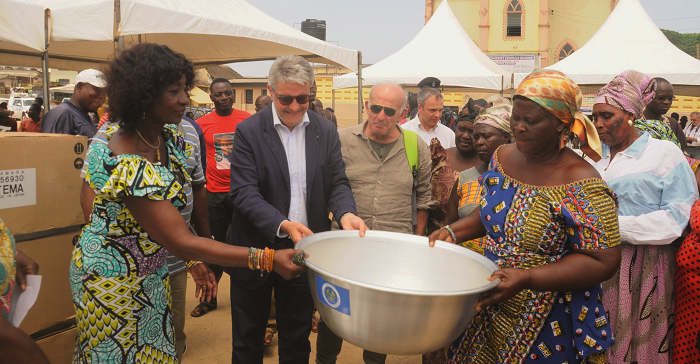
Italian delegation interacts with Apam fishermen
An Italian delegation currently in the country has promised fishermen of its support to facilitate the creation of a resilient local fisheries cluster to enhance the industry in Ghana.
The promise is in furtherance of an agreement signed between the delegation from the Fish Production District of Mazara Del Vallo-Cosrap of Italy and the Ministry of Fisheries and Aquaculture Development, in October 2015, aimed at improving fish production in Ghana.
The agreement is also intended to increase the contribution of the fishing industry to Ghana’s Gross Domestic Product (GDP) from 4.7 per cent to 27 per cent.
The President of the Fish Production District of Mazara Vallo-Cosrap and leader of the delegation, Mr Giovanni Tumbiolo, made the promise when members of the delegation and their Ghanaian partners, led by the sector Minister, Ms Sherry Ayittey, interacted with fishermen along the Apam fishing coast at the weekend.
Advertisement
The visit was also to enable the visiting team to make an assessment of the Apam fishing community towards the building of the fisheries cluster.
A steering committee which was inaugurated in Accra on July 8, 2016, after the agreement had been signed, will later carry out in-depth feasibility studies to enhance implementation.
The areas of collaboration, according to the agreement, include the development of fishery ports in Ghana, construction and maintenance of fishing boats and the building of electronic and mechanical workshops.
Apam fishing bay
Mr Tumbiolo said the Apam fishing bay was a perfect site for a landing beach, a fish market and a cold store.
He said the collaboration would add value to the fishing industry and promote the blue economy model, adopted under the agreement, as a tool to increase fish production in Ghana.
The blue economy is an international model that seeks to shift society from scarcity to abundance with what is locally available by tackling issues that cause environmental problems.
The blue economy, in relation to the fisheries cluster development in Ghana, will include the conceptualisation of the ocean into a development space where spatial planning integrates conservation, sustainable use, oil and mineral wealth extraction, bio-prospecting, sustainable energy production and marine transport.
Mr Tumbiolo said the collaboration would also facilitate an exchange training programme between fishermen in Ghana and Mazara in the area of aquaculture development and other scientific ways of marine fishing to enhance both sectors.
Benefits of the Blue Economy
Ms Ayittey, for her part, said it was very important for the country to pursue the blue economy because it would bring the fishermen in contact with modern ways of fishing to enhance production.
She said the collaboration would open up a lot of research opportunities, facilitate education for young people and enhance technical projection into the fishing industry.
The minister said in the main, the initiative would promote the development of fishery and aquaculture in Ghana because the Italians would provide expertise and carry out a feasibility study to identify sites for cluster activities, with support from their Ghanaian counterparts.
She reiterated the government’s committment to ensuring growth of the fishing industry and said a technical committee had been set up to establish a scholarship scheme for the children of fishermen to ensure that they also attained high levels of education.
Ms Ayittey later presented 15 aluminium pans and five bundles of wire mesh each to five fish-processing women’s groups in the area in support of their activities.
Chief of Apam
The Chief of Apam, Nana Edu Effirim X, on behalf of fishermen and fishmongers in the area, expressed gratitude to the Italian delegation and said he was ready to support the blue economy project and urged all to embrace it.
